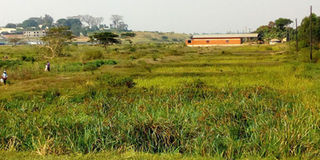Government abandons fish project

An overview of Mbale Aquaculture Development and Hatchery Centre. PHOTO BY LEONARD MUKOOLI
What you need to know:
- Contractor. GQ Investment Limited, a Kampala-based company, was contracted to do the work but later abandoned the site over nonpayment.
- Other project. Government has similar projects in Entebbe, Gulu, and Kabale. It plans to boost the production activity beyond that of Kajansi, and allow access to all farmers who are interested in fish farming activities around the nation, if permitted.
The Aquaculture Development and Hatchery Centre in Mbale District has stalled for nine years now after government’s attempts to rehabilitate and construct a hatchery for rearing fish at the site hit a snag.
The centre in Nkoma Ward in Northern Division, two kilometres from Mbale Town, has a capacity of 60 ponds, which have since dried up and turned into a grazing field by the community members.
The water systems that were constructed to supply the hatchery and the ponds, before the contractor fled, have broken down. This has rendered one of the biggest aquaculture centres, established in the 1950s to promote fish farming in the country, useless to fish farmers in the sub-region.
According to Mr Bernard Mujasi, the district chairperson, they have on several occasions sought an explanation on why the project has been abandoned yet in 2008, the government through the Ministry of Agriculture released Shs1.8 billion for rehabilitation in vain.
“The ministry promised to standardise the project into a modern fisheries training centre but for several years now, we don’t see any results,” Mr Mujasi says.
He says in 2008, the ministry had procured GQ Investment Limited, a Kampala-based company, to do the work but later abandoned the site over nonpayment.
“With 75 per cent works complete on site, as a district, we thought the two parties would settle their disagreements. However, the ministry failed and the contractor fled the site and the project was bogged down,” he says.
Employment opportunities
He adds that if the project was completed, it would have been beneficial in promoting farming and creating employment opportunities.
“This is one of the projects which government should take serious. We only need a small budget of installing the pumps because most of the work was accomplished by the contractor,” he says.
Mr Henry Manana, the district councillor for Northern Division, says the project failure was due to arrogance and negligence by the Ministry of Agriculture.
“We were sidelined in this project. There was no way we, as leaders, would have supervision powers over a project that was not unveiled to us officially,” he says.
He adds that there is no value for money since ponds have dried up and the constructed systems are broken down.
Mr Thomas Muzungu, the information officer for Mbale District, also blames the ministry saying it would have been beneficial if the project was left in the hands of the district.
“We have tried to engage the ministry in having the project manned by the district but we have not yet received any positive response,’ Mr Muzungu says.
The agricultural officer Mbale District, Mr Julius Peter Ayo, says for such projects to succeed, there is need for sustainable funding.
“It is not possible to sustain such a project with little fund because ponds need enough money to maintain them,” Mr Ayo says.
He says the ministry was forced to hand over the project to National Research Organisation (Naro).
Government speaks out
Mr Edward Rukunya, the director of fisheries department in the Ministry of Agriculture, Animal Husbandry and Fisheries, acknowledges that the project was handed over to Naro, and that the fish fry and the hatchery is functioning.
“Basing on my knowledge, the fish fry and the hatchery are functioning and it was handed over to Naro,” he says.
However, the director of Naro, Dr Laurence Owere, refutes the ministry statement saying that they have not yet taken over the centre.
“We have not yet signed a memorandum of understanding (MoU) with ministry before we start off the works,” Dr Owere said.
He however promises to boost the production activity beyond that of Kajansi, and allow access to all farmers who are interested in fish farming activities around the nation, if permitted.
“Some farmers go to Kenya to search for these services but for us, our intention is to ease access of fish products to all farmers around the country,” he notes.
Lost hope
Ms Ritah Namakula, one of the fish farmers says they had hope that the government was revamping the centre.
“We had hopes of boosting our fish farming business but it was short lived. Our expectation of learning more from the centre also vanished,” she says.
She adds that the project would by now be regional a training centre to fish farmers in the sub region as more jobs would have been created. Government has similar projects in Entebbe, Gulu, and Kabale.



